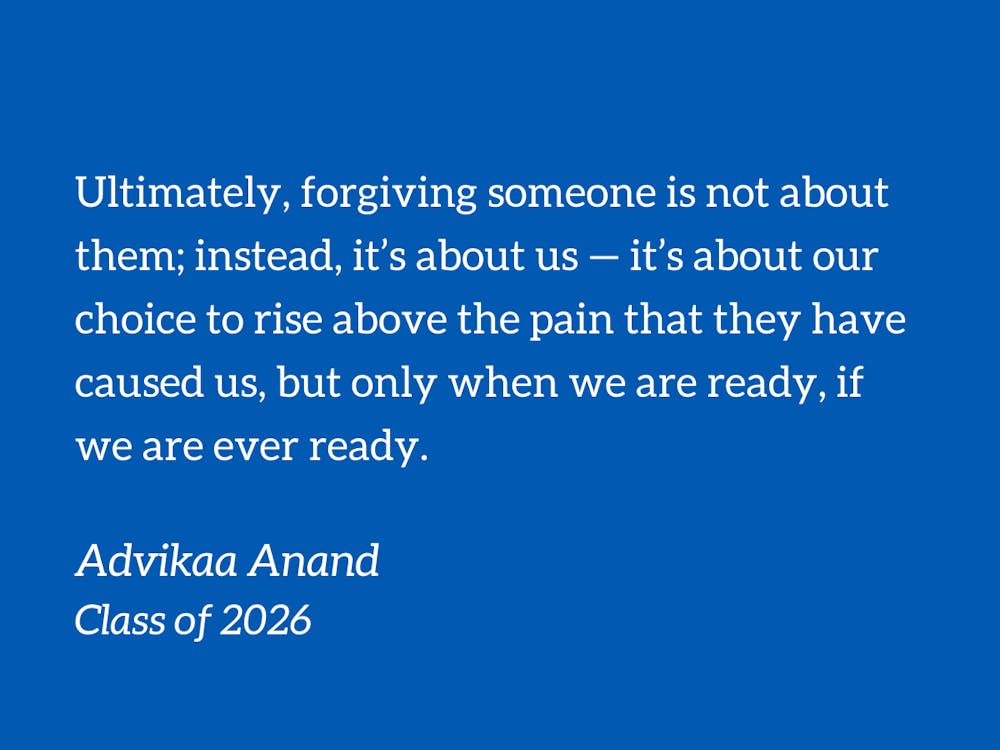A bright neon red sign hung outside my elementary school guidance counselor’s office. In delicate letterings, it laid out the steps one ought to take if their feelings had been hurt. The first steps outlined various combinations of having open conversations with the other person and being honest about your feelings.
The final step, however, was highlighted in neon yellow and big bold letters: Step 5: Be the bigger person. Forgive, and move on.
“Be the bigger person. Forgive, and move on,” I whispered these words to myself over and over again, ingraining them in my heart.
At first, it was easy to follow this directive — to forgive and forget. It was easy to forgive the boy in my second-grade class who made fun of me because I was Indian; after all, he didn’t know any better. It was easy to forgive the girls in middle school who didn’t let me dance with them in our Street Jam performance because I was the new girl in the class; after all, they didn’t know any better.
But as I grew older and learned to distinguish the difference between intention and action, it became harder and harder to leap over my feelings and move on. Not only was I finding it more difficult to forgive others but also to forgive myself and move on, especially as my expectations from both others and myself grew more demanding. I developed a deep fear of getting in trouble and upsetting others. If I did, I knew I’d have to tussle with my own inner guilt — a reckoning that I found deeply troubling.
My tendency to ruminate over the difference between intention and action and overthinking whether I could expect someone to know better and eventually, do better is not well taken in a culture that prizes forgiveness. An unwillingness to move past our own feelings and forgive is often seen as a sign of arrogance and pride. It’s unpopular to posit that sometimes, it’s okay to prioritize your mental and emotional well-being over the disconcerting sentiments of another person — after all, most ethical tenets seem to suggest that in order to become the best versions of ourselves, we must be better than our worst embitterments.
But such a view oversimplifies the nuances of forgiving. As Saumya Kalia of The Swaddle Project puts it, “The association of forgiveness with strength and moral superiority is wildly dismissive of genuine emotions and experiences.” To push the person in pain to leap over their aching hearts diminishes the gravity of their feelings and invalidates their sensitivities, an action that can reinvigorate previously borne trauma by compelling people to gaslight themselves over their emotions.
Psychological research reveals this dark side of forgiveness. As a 2014 study by James McNulty found, “The tendency to express forgiveness may lead offenders to feel free to offend again by removing unwanted consequences for their behavior.” Immediate forgiveness, posits McNulty, enables people to avoid repercussions such as “anger, criticism, rejection and loneliness” and, eventually, escape accountability for their behavior.
Forgiveness is not easy. Telling people to cope with their pain by justifying the actions of those who have wronged them and encouraging them to jump to immediate forgiveness and move on does not offer a solution that is sensitive to their emotions.
But that doesn’t mean that it should not be done.
Ultimately, forgiving someone is not about them; instead, it’s about us — it’s about our choice to rise above the pain that they have caused us, but only when we are ready, if we are ever ready. This process is not one that can be rushed — it may take days, weeks, or months for individuals to reach a place where they can decide that they are finally okay. This nonlinear path to healing is only disrupted by moralizing advice on the magnanimity of forgiveness.
On the contrary, what we must prioritize — even when someone has wronged us — is compassion. No matter how we may seethe with anger or writhe with pain, we must never cease to see them as living, breathing human beings with stories as vivid and complex as our own. Yet, while these stories may serve as explanations of their hurtful behavior towards us, they will never suffice as justification for their actions, a basis for blanket, immediate forgiveness, or permission for complete reentry into our lives. Nor will the ways in which they have rewritten our story serve as any pretext for us to be outwardly unkind or cruel to them.
Because they are still people.
But they are no longer our people.
Advikaa Anand is a Trinity sophomore. Her column typically runs on alternating Thursdays.
Get The Chronicle straight to your inbox
Sign up for our weekly newsletter. Cancel at any time.
Advikaa Anand is a Trinity sophomore and an opinion managing editor of The Chronicle's 119th volume.

